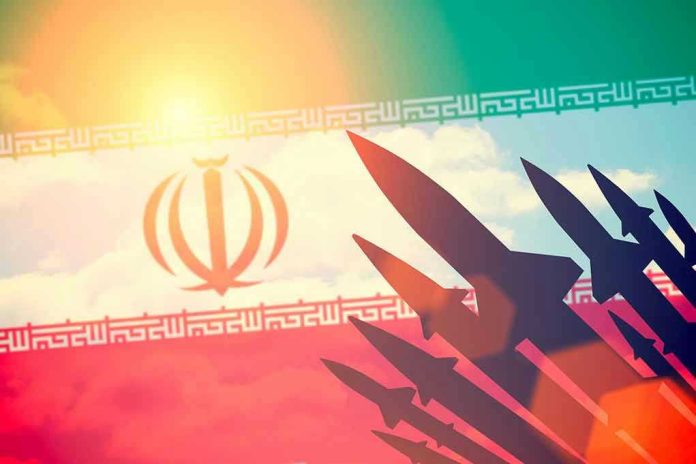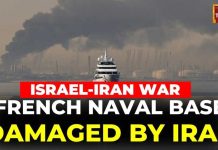
Iran’s bold claim that its missile arsenal now “far surpasses” pre-war levels after U.S.-Israeli strikes is a direct challenge to American security and a stark reminder of the dangers posed when weak policies let rogue regimes regroup.
Story Snapshot
- Iranian officials boast their missile program is stronger than before the June 2025 “12-Day War,” despite a massive allied bombing campaign.
- Tehran’s missile expansion threatens regional stability and undermines U.S. and Israeli defense efforts.
- Experts warn Iran’s rapid recovery signals a shift in deterrence strategy, escalating the arms race in the Middle East.
- Trump’s administration faces a critical test in restoring deterrence and safeguarding American interests after the failures of prior appeasement.
Iran’s Missile Boast: A Wake-Up Call for U.S. Security
In November 2025, Iranian leaders publicly declared their missile capabilities now exceed pre-war levels, just five months after a coordinated U.S.-Israeli bombing campaign. Foreign Minister Abbas Araghchi and Defense Minister Brig. Gen. Aziz Nasirzadeh announced this “military revival” as evidence that Iran’s defense industry not only survived but expanded. This brazen announcement follows a period when, under past leftist policies, Iran exploited American restraint, rebuilding faster than military strategists expected. The regime’s focus has shifted away from nuclear development to mass missile production, directly threatening allies and U.S. interests.
Iran’s missile program has always been central to its defense and regional ambitions, but the current surge marks a dangerous escalation. The program’s roots trace back to the Iran-Iraq War, but decades of sanctions and conflict pushed Tehran to prioritize missiles over modern air power. Between 2019 and 2024, Iran unveiled underground “missile cities” and conducted repeated launches against U.S. and Israeli targets. The June 2025 “12-Day War”—sparked by Israel’s preemptive strike and followed by U.S. precision bombing—was supposed to cripple Iran’s arsenal. Instead, Iran’s leadership now claims not only rapid recovery but also new missile types in greater numbers and quality, challenging the effectiveness of Western deterrence.
Regional Threats and the Failure of Weak Deterrence
Iran’s expanded missile arsenal is a direct threat to Israel, Saudi Arabia, the United States, and all regional partners. Tehran has long used its missile force to compensate for a weak air force, leveraging proxy groups like Hezbollah and the Houthis to project power and destabilize the region. The resurgence of Iran’s missile program, after what should have been a devastating blow, exposes the risks of any U.S. policy that fails to sustain maximum pressure. The Trump administration now faces the urgent task of repairing the damage left by years of appeasement and globalist neglect, ensuring America’s adversaries cannot regroup and threaten our allies or homeland.
Iran’s missile claims have already rattled U.S. defense planners and regional allies. The regime’s rhetoric is not only about military strength but also about testing the resolve of the international community. Industry experts, including those from the Foundation for Defense of Democracies and the Jerusalem Institute for Strategy and Security, caution that Tehran is using its arsenal as leverage to ease sanctions and diplomatic isolation. Meanwhile, Iran’s boasts about developing a 10,000km intercontinental ballistic missile remain unverified, raising concerns about propaganda and the regime’s true capabilities. Regardless, the speed of Iran’s recovery and expansion signals a recalibration of deterrence strategy and the threat of a new arms race in the Middle East.
Implications for U.S. Policy and the Conservative Response
The resurgence of Iran’s missile program underscores the dangers of abandoning American strength and constitutional principles. As inflation, open borders, and failed foreign policy from the previous administration fade into history, conservatives demand a renewed commitment to robust national defense and a rejection of globalist appeasement. The Trump administration’s challenge is clear: restore deterrence, strengthen alliances, and ensure that rogue regimes like Iran cannot exploit American weakness to threaten our way of life. Only through vigilant leadership and a return to foundational values can the U.S. confront the escalating dangers in the Middle East and protect liberty at home.
Iran claims missile power now 'far surpasses' pre-war levels after Israeli bombardment https://t.co/BToPfMP3yT
— Fox News Politics (@foxnewspolitics) November 12, 2025
While some of Iran’s claims may be exaggerated, the broader lesson is undeniable: adversaries grow bolder when American resolve falters. The conservative movement recognizes that constitutional rights, strong borders, and a powerful military are not negotiable—especially when hostile regimes openly threaten America and its allies. The road ahead requires vigilance, clarity, and a principled stand against forces that seek to destabilize the world and undermine American security.
Sources:
Iran Claims Missile Power Now ‘Far Surpasses’ Pre-War Levels After Israeli Bombardment – Fox News
Iran’s Ballistic-Missile Program – Wikipedia
What Are Iran’s Nuclear and Missile Capabilities? – Council on Foreign Relations
Iran Ramping Up Missile Production as Another Potential War with Israel Looms – TwZ News
Shallow Ramparts: Air and Missile Defenses in the June 2025 Israel-Iran War – FPRI
Tehran Claims 10,000km ICBM Near Ready for Service – Defence Security Asia
Iran International: Iran’s Resistance to Western Pressure and Its Missile Program

















